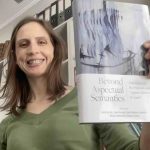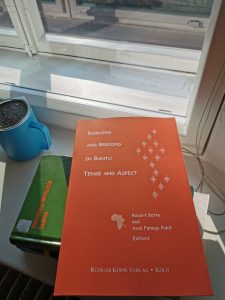I am inordinately proud to announce that I have a new paper out in the journal Semantic Fieldwork Methods. The paper is called “The witness and the alibi: A method for eliciting temporal contrasts in reported speech” and it describes a simple but fun method I developed for looking at how temporally “graded” tense and aspect markers are used in reported speech in isiNdebele. Here is the abstract:
I propose a simple, two-stage storytelling process used for investigating multiple tense contrasts in reported speech and illustrate a basic example of its use from a pilot study in isiNdebele. IsiNdebele is a Nguni Bantu language of South Africa with two degrees of past tense marking and three future forms that are less clearly differentiated for temporal distance. The method involves translating a conversation with references to several past and future events and then role-playing a courtroom testimony in which the conversation is reported. I also describe a simple complementary picture-card–based method.
Again, it’s hard to overstate how excited I am to be published in this journal on my favourite topic.
I’m also happy to announce a chapter that came out slightly less recently in the OUP  volume Beyond aspectual semantics: Explorations in the pragmatic and cognitive realms of aspect, edited by Astrid De Wit, Frank Brisard, Carol Madden-Lombardi, Michael Meeuwis, and Adeline Patard. This volume was published in March, but I only recently got my hands on it, first because I was doing fieldwork in South Africa, and then because I failed to understand the new department mail system. Anyway, I have a chapter with Hilde Gunnink, Ponsiano Kanijo, and Tim Roth called “Aspect and evidentiality in four Bantu languages“. The link goes to a slightly older “authors'” version, but I recommend the whole volume, and I hope your library will purchase it! The abstract:
volume Beyond aspectual semantics: Explorations in the pragmatic and cognitive realms of aspect, edited by Astrid De Wit, Frank Brisard, Carol Madden-Lombardi, Michael Meeuwis, and Adeline Patard. This volume was published in March, but I only recently got my hands on it, first because I was doing fieldwork in South Africa, and then because I failed to understand the new department mail system. Anyway, I have a chapter with Hilde Gunnink, Ponsiano Kanijo, and Tim Roth called “Aspect and evidentiality in four Bantu languages“. The link goes to a slightly older “authors'” version, but I recommend the whole volume, and I hope your library will purchase it! The abstract:
Fully grammaticalized, obligatory evidentiality systems are thought to be rare in the languages of Africa, and in Bantu languages in particular. However, ongoing semantic research in Bantu languages continues to uncover systems that are primarily evidential in their semantics, as well as other grammatical categories that can be exploited secondarily to express evidential distinctions. In this chapter, we discuss Fwe, Nyamwezi, Nzadi, and Ikoma, four geographically and typologically diverse Bantu languages in which distinct grams with overlapping tense–aspect readings exhibit salient distinctions in their evidential force. The evidentiality distinctions seen in these languages add further support for the robust cross-linguistic link between resultatives and indirect evidentials. Links between progressive aspect and ‘authoritive’ (first-hand sensory or trusted second-hand) evidentials are also suggested.
This is the paper that inspired my further work on “Looking for evidentiality (and mirativity) in Bantu“.



